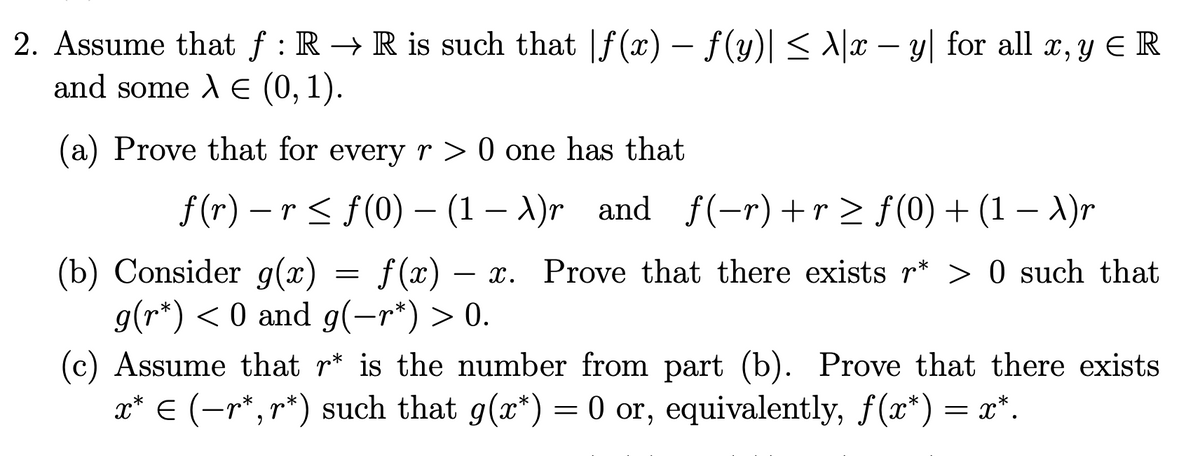Assume that f : R → R is such that |f(x) – f(y)| < \|x – y| for all x, y E R and some A E (0, 1). (a) Prove that for every r > 0 one has that f(r) – r< f(0) – (1 – A)r and f(-r)+r> f(0) + (1 – A)r (b) Consider g(x) g(r*) < 0 and g(-r*) > 0. (c) Assume that r* is the number from part (b). Prove that there exists x* € (-r*, r*) such that g(x*) = 0 or, equivalently, f(x*)= x*. f (x) – x. Prove that there exists r* > 0 such that
Assume that f : R → R is such that |f(x) – f(y)| < \|x – y| for all x, y E R and some A E (0, 1). (a) Prove that for every r > 0 one has that f(r) – r< f(0) – (1 – A)r and f(-r)+r> f(0) + (1 – A)r (b) Consider g(x) g(r*) < 0 and g(-r*) > 0. (c) Assume that r* is the number from part (b). Prove that there exists x* € (-r*, r*) such that g(x*) = 0 or, equivalently, f(x*)= x*. f (x) – x. Prove that there exists r* > 0 such that
Elements Of Modern Algebra
8th Edition
ISBN:9781285463230
Author:Gilbert, Linda, Jimmie
Publisher:Gilbert, Linda, Jimmie
Chapter5: Rings, Integral Domains, And Fields
Section5.4: Ordered Integral Domains
Problem 1E: Complete the proof of Theorem 5.30 by providing the following statements, where and are arbitrary...
Related questions
Question
Real An

Transcribed Image Text:2. Assume that f : R → R is such that |f(x) – f(y)|< \/x – y| for all x, y E R
and some A E (0, 1).
(a) Prove that for every r > 0 one has that
f (r) – r < f(0) – (1 – A)r and f(-r)+r > f(0) + (1 – A)r
(b) Consider g(x) = f(x) –
g(r*) < 0 and g(-r*) > 0.
x. Prove that there exists r* > 0 such that
(c) Assume that r* is the number from part (b). Prove that there exists
x* € (-r*, r*) such that g(x*) = 0 or, equivalently, f(x*) = x*.
Expert Solution
Step 1
Explanation
Given - assume that such that for all x, y and some
To prove -
(a) prove that for every r>0 one has that
(b) consider prove that there exist r*>0 such that
(c) assume that r* is the number from part (b) . prove that there exist or, equivalently ,
Step by step
Solved in 4 steps

Recommended textbooks for you

Elements Of Modern Algebra
Algebra
ISBN:
9781285463230
Author:
Gilbert, Linda, Jimmie
Publisher:
Cengage Learning,

Linear Algebra: A Modern Introduction
Algebra
ISBN:
9781285463247
Author:
David Poole
Publisher:
Cengage Learning

Elements Of Modern Algebra
Algebra
ISBN:
9781285463230
Author:
Gilbert, Linda, Jimmie
Publisher:
Cengage Learning,

Linear Algebra: A Modern Introduction
Algebra
ISBN:
9781285463247
Author:
David Poole
Publisher:
Cengage Learning